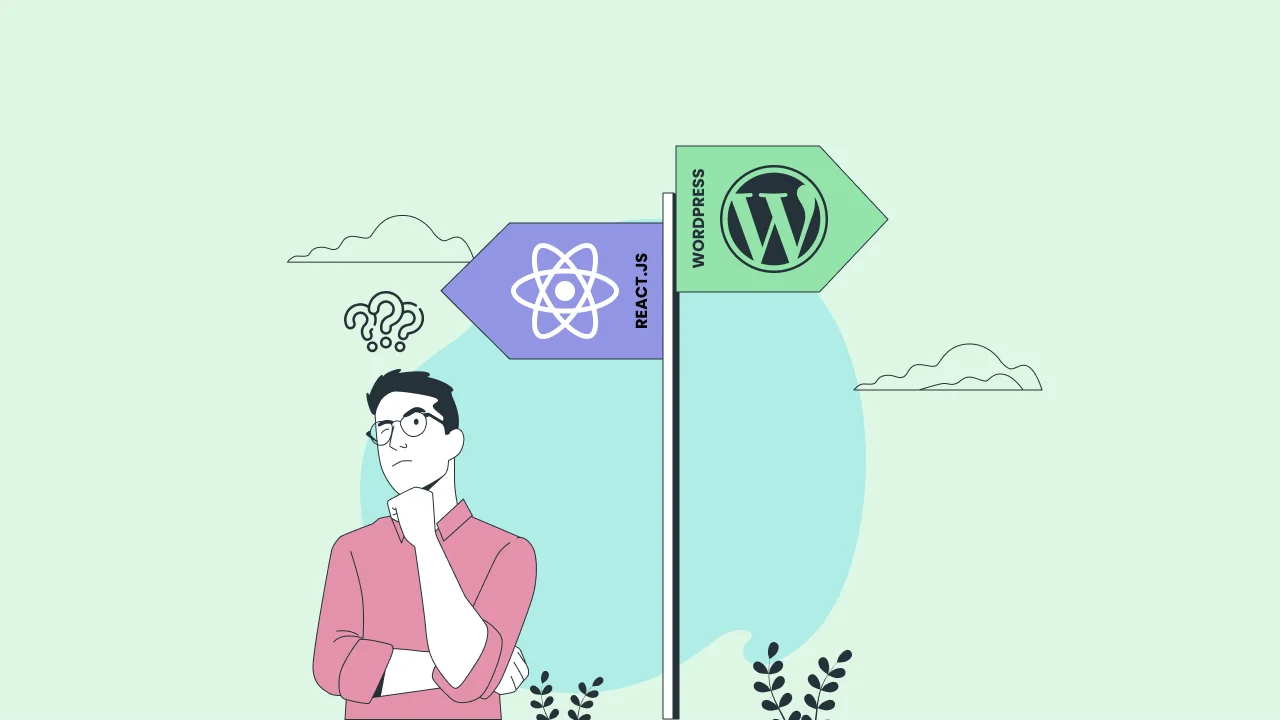Large organizations in today’s digital age necessitate a meticulous selection of an appropriate Content Management System (CMS) to manage their online content effectively.
Among the choices available for Enterprise CMS options, Drupal is a popular option.
If you have been investigating various CMS solutions and now find yourself here with an interest in exploring the capabilities of Drupal,
allow me to provide guidance on understanding what Drupal is, its functionality, and the reasons behind its widespread admiration for streamlining online experiences.
What is Drupal?
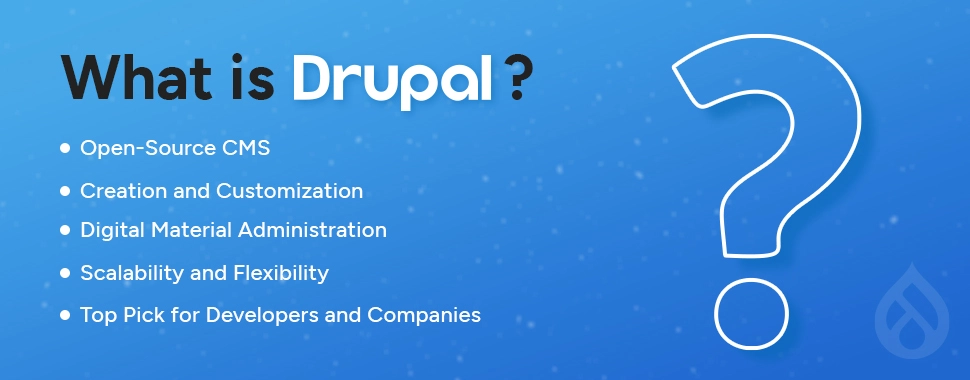
Drupal is a game-changer for businesses, making it easy for them to create and control content on their websites and apps.
At its core, Drupal operates as a open-source Content Management System (CMS): it’s pivotal in digital content creation; customization and efficient management.
Characterized by accessibility and a collaborative development model due to its open-source nature, Drupal permits an international community of developers to contribute towards continual enhancement.
Open-Source CMS
Drupal’s source code, as an open-source platform, is freely accessible for viewing, modifying and distributing.
This transparency nurtures collaboration and innovation within the development community while affording users the liberty to tailor-make the platform according to their unique requirements.
Creation and Customization
Empowering users to construct an array of diverse websites and applications especially dealing with big websites and large databases is Drupal’s forte.
Its modular architecture, designed for everything from personal blogs to enterprise-level platforms, permits unparalleled customization.
Developers possess the ability not only to create but also seamlessly modules, themes, and functionalities that cater specifically to their project requirements.
Digital Material Administration
Drupal effectively administers digital material as one of its main responsibilities; through its user-friendly interface, content creators can author, modify and organize content with ease.
This feature is essential for companies and organizations seeking a dynamic online presence; it empowers them to publish articles, multimedia – in fact, all other types of digital content.
Scalability and Flexibility
Recognized for its flexibility, Drupal boasts an extensible and modular architecture; this characteristic enables developers to tailor the platform for a diverse range of applications.
Moreover with scalability as one of its strengths – Drupal can adjust project requirements effectively: it doesn’t matter whether we are constructing a large-scale website or web application.
Companies seeking to expand and enhance their online presence find it a desirable option due to its scalability.
Top Pick for Developers and Companies
Known for its reliability, scalability, and flexibility; Drupal is indeed a popular choice among both businesses and developers.
The feature-rich capabilities of this CMS which can be tailored to meet specific company needs significantly benefit companies: it offers them unparalleled creative freedom that developers particularly value.
The global Drupal community, in a bid to maintain its competitiveness and relevance within the fast-evolving digital landscape, persistently enhances the platform.
Who uses Drupal? Industries
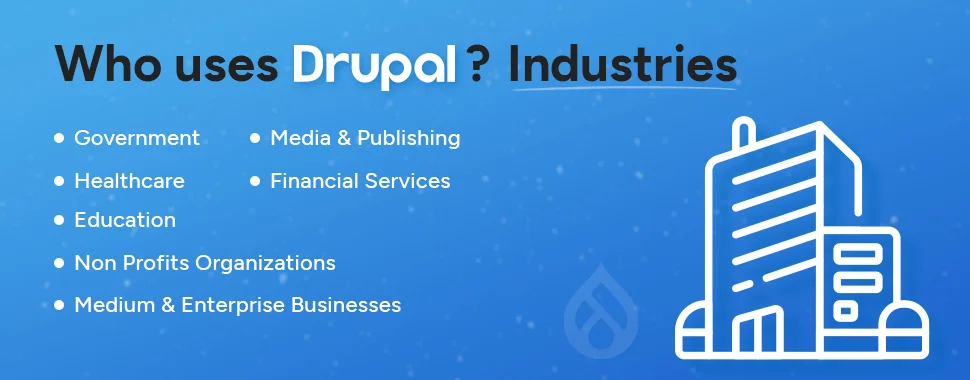
A wide range of businesses prefer Drupal for its customization and functionality; they find its scalability, rich features, and modular architecture meeting their specific requirements across various industries.
Now, let’s conduct an in-depth examination: which sectors indeed regard Drupal as a priceless resource?
Government
To build feature-rich, secure, and accessible websites, government organizations and agencies employ Drupal.
Drupal’s adaptability enables the integration of specific features governmental sites require: tasks like public information dissemination and online service form provision – guaranteeing adherence to accessibility guidelines with this platform is a surety.
Healthcare
In the paramount considerations of user experience, security and privacy in the healthcare field: Drupal distinguishes itself; it provides a framework precisely crafting websites to deliver medical data, facilitating appointment booking and offering patient portals.
Through its capacity to securely manage sensitive data, the platform also ensures compliance with stringent regulations in the healthcare sector.
Education
For educational institutions of all sizes, Drupal is vital because it enables them to create dynamic and captivating online platforms.
Drupal makes the process of creating community platforms for academic collaboration, e-learning portals, and school websites easier.
Its versatility is essential for meeting the various demands of educational establishments.
Non Profits Organizations
Nonprofits love Drupal because of its affordability and talent for creating visually appealing websites.
Nonprofits may utilize this platform to create user-friendly fundraising channels, publish captivating stories, and engage with their audience in an effective manner.
The community-focused methodology of Drupal nicely matches the cooperative nature of many nonprofit projects.
Medium & Enterprise Organizations
Drupal supports a wide range of sectors and business sizes, which is evidence of its versatility. Drupal provides a dependable and reasonably priced web presence solution that is perfect for small businesses.
However, because the platform’s scalability allows them to handle massive amounts of content, complex workflows, and a variety of functionalities, huge organizations like it.
Media and Publishing
Media organizations and publishing houses utilize Drupal to construct content-rich websites, presenting a variety of news, articles, and multimedia.
The platform’s robust content management capabilities combined with its ability to handle heavy traffic make it an attractive option for adaptable and reliable platforms sought after by media companies.
Financial Services
Utilizing Drupal, a robust website creation framework with inherent security features, offers the financial industry, where compliance and security are pivotal.
Financial institutions can craft client portals: polished online interfaces that provide their customers an impeccable web experience.
Furthermore, through Drupal’s versatile capabilities they may construct informative websites for public outreach or establish secure contact channels to foster effective communication.
Why use Drupal? Features
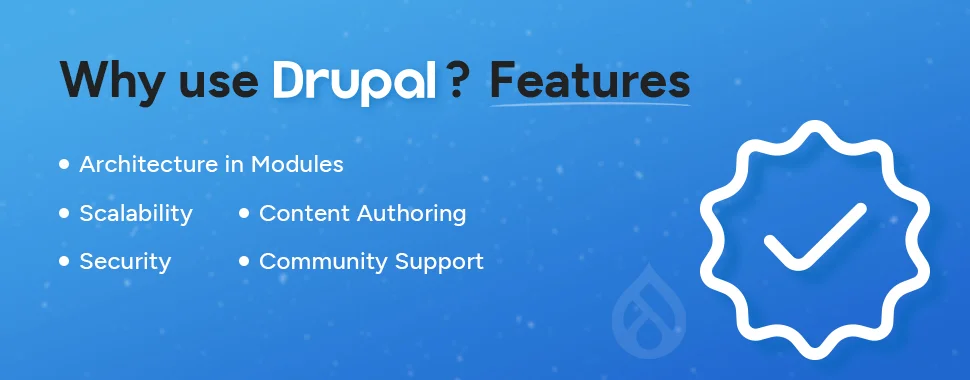
Taken together, Drupal’s extensive feature set positions it as a leading choice for constructing dynamic and diverse online experiences; this contributes significantly to its pervasive adoption within web development.
Let us now delve into the primary attributes that distinguish Drupal:
Architecture in Modules
Drupal’s modular architecture, which enables developers to split the system into small work units called modules, is what makes the platform so appealing. Every module has a distinct function; also, their adaptability is clear since they grow and change with ease.
Because of its modularity, developers may easily incorporate new features and capabilities without jeopardizing the functionality of the main system, allowing them to customize the platform to meet the unique needs of each project. By doing this, efficiency which is, in fact, an essential component of any development process as well as innate flexibility are ensured.
Scalability
Drupal’s design is adaptable to a wide range of project sizes and complexity, showcasing its capacity to change and grow with the demands of its users.
This is valid whether the application is for a large corporation, a well used e-commerce platform, or just a website that helps small businesses. Scalability turns out to be crucial because it enables businesses and organizations to plan for expansion as well as attract more customers in the future.
Security
A strong emphasis on security characterizes Drupal’s design philosophy: the platform boasts intrinsic security features, safeguarding against not only present security flaws but also online threats. Regularly delivered updates and patches specifically tailored to address emerging threats ensure that Drupal websites remain secure in the face of future dangers.
Businesses valuing the safeguarding of user information and sensitive data can depend on Drupal, given its unwavering dedication to security.
Content Authoring
Drupal offers an intuitive, user-friendly environment for content creation. The straightforward interface simplifies the process of creating and managing digital content – a task achievable by content creators with no technical experience.
Moreover, this platform provides a wide variety of available content types that facilitate diverse structure development: from basic articles to complex multimedia presentations; thereby enhancing convenience and flexibility in presentation options.
Businesses can maintain a flourishing and captivating online presence, thanks to its accessibility; they need not employ professional technical staff.
Community Support
The lively and engaged international community that fosters Drupal’s growth is just as important to the platform as its capabilities.
The Drupal community is an inclusive and cooperative group of programmers, designers, and fans that work together to continuously enhance the platform.
Because of everyone’s combined efforts, Drupal is always at the forefront of technology, with frequent upgrades, tons of resources, and new features.
Beyond development, the community offers documentation, forums, and events in addition to other services, creating a strong environment in which Drupal users can exchange information and seek advice.
Quick Features Summary
| Feature | Description |
|---|---|
| Security | The openness allows millions of people worldwide to examine and improve the code, making it very secure. |
| Scalability | Layout Builder streamlines content management, enhancing scalability. |
| Stability | Provides a very stable environment, ensuring consistent functionality. |
| SEO-Packed CMS | Built-in tools optimize content visibility on search engines. |
| Extendable via APIs | Highly extensible, facilitating integration with external apps. |
| Customization | Easily and extensively customizable to meet specific requirements. |
| Inbuilt Modules | Inbuilt module provides essential functionality that can be leveraged to build and manage dynamic and feature-rich websites. |
| Contributors Modules | Drupal Contributors have put years of work into providing free pre-built modules. |
| Content Management | Drupal allows for content management with features like CKEditor for rich text editing and moderation stages for blog posts, ensuring seamless content creation and review. |
| Better Search Tools | Boost user experience with improved search capabilities. |
| In-Site Search | Provides robust in-site search capabilities. |
| Runs Headless | Supports headless architecture for flexible front-end development. |
| Flexible Integration | Easily connects with a wide range of services and systems. |
| Flexible Content Architecture | Utilizes cPanel for adaptable content management. |
| Multisite | Allows various databases to be supported across numerous sites using the same codebase. |
| Multilingual | Provides translation capability for 90 languages while preserving data in a single database and smooth setup for translation. |
The Best Drupal Development Approach
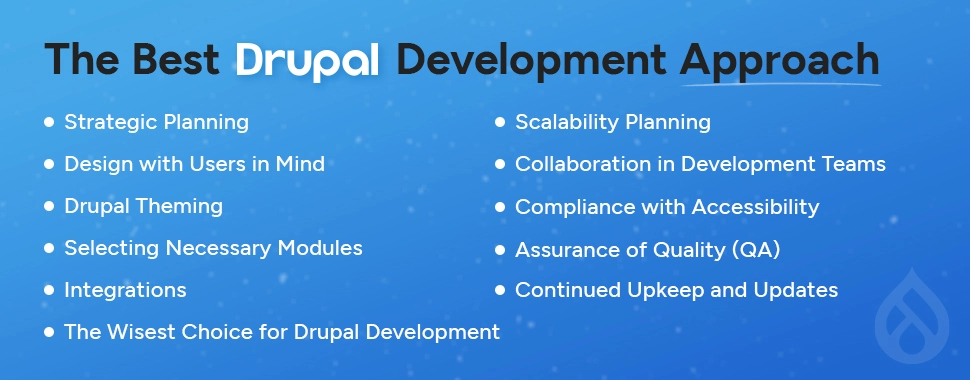
Strategic Planning
Create a thorough, foundation-laying strategic plan before you begin development. Clearly state the main goals, target audience, and features of the project.
Don’t forget to think about any necessary scalability and future improvements. The prerequisites for the success of your Drupal project are set by a well-planned approach.
Design with Users in Mind
Adopting user-centric design concepts will help you prioritize the user experience. Test the usability of the design, get user feedback, and make design iterations based on user experience.
The ability to theme Drupal facilitates the development of user-friendly, aesthetically pleasing interfaces that increase user engagement.
Drupal Theming
Design the visual appearance of your website and create a custom theme or customize an existing one to match your design. Drupal provides theming capabilities using HTML, CSS, and the Twig templating engine along with providing themers a platform for building flexible, responsive and high performing themes. Also, leveraging to create a custom sub-theme from the parentin-built theme in Drupal, allowing developers to focus on the main theme changes.
Additionally, by employing Drupal’s theming framework – a well-known tool for its versatility, responsiveness and performance – brands can ensure their visual identity fits perfectly with UX objectives, promoting an uninterrupted online experience across all touchpoints.
Selecting Necessary Modules
Modules offer a wide range of choices, including the including complex e-commerce capabilities, SEO performance improvement, cache management Security and building a stable, efficient, and scalable Drupal website
Your project’s requirements should guide your module selections: Drupal’s modular architecture allows developers to expand functionality by strategically integrating these modules.
However, critical issues like stability, community support, and compatibility with the chosen Drupal version require careful consideration and must not be overlooked.
Integrations
Choosing connectors that enhance user experience and facilitate project goals – such as analytics tool utilization, payment gateway integration or social media engagement – elevates the usefulness of a Drupal site through interaction with external services and APIs.
To guarantee stability and compatibility of these integrations, rigorous testing is imperative.
Scalability Planning
Think about scalability right from the start of the project. Select a hosting environment that has room for expansion in the future.
Code, database queries, and assets should all be performance-optimized. As the project develops, a well-architected Drupal site can easily accommodate increased traffic and additional functionality.
Collaboration in Development Teams
It’s critical for development teams to collaborate effectively. Adopt collaborative development practices, utilize version control systems like Git for code management, and establish explicit communication routes.
Project stability and code quality are enhanced by continuous integration techniques and routine code reviews.
Compliance with Accessibility
Drupal prioritizes accessibility. Make sure the website complies with accessibility guidelines so that people of different abilities may use it.
To ensure that the website complies with industry standards, test it using accessibility tools and guidelines.
Assurance of Quality (QA)
Establish a thorough quality assurance procedure to find and fix problems before launch. Carry out comprehensive testing, encompassing security, performance, and functional testing.
Rigorous QA Testing techniques are used to check the responsiveness of the website in different devices.
Continued Upkeep and Updates
Make plans for continued upgrade and apprise. Drupal frequently publishes new features and security updates.
Keep up with the most recent releases, install security updates as soon as possible, and make ongoing improvements to the website based on user input and new technological developments.
The Wisest Choice for Drupal Development
You now understand that developing Drupal is more complex than developing other traditional content management systems. Furthermore, negotiating the complexities of internal Drupal development poses a special set of difficulties.
- Its strong architecture comes with a steep learning curve.
- Few competent Drupal developers exist, making it harder to build an inhouse team.
- In order to stay current with emerging trends and security measures, specialized knowledge and expertise is necessary.
These obstacles may cause significant delays in project completion dates, a decline in project quality, and an increase in overall development expenses.
Therefore, hiring the right Drupal development company for your project is the wisest course of action.
This is where cmsMinds comes into play.
As one of the leading Drupal development companies, cmsMinds brings to the table a team of experts with years of experience in Drupal, extensive knowledge base and strong skill sets to help with your Drupal project.
Conclusion
Drupal solidifies its reputation as a trustworthy solution for creating dynamic, safe websites in the always changing world of online communication. Companies that want to make a lasting impression on the internet need to understand not only its potential, but also how important it is to collaborate with the right people.
Moreover, adopting Drupal’s scalability – a monument to its flexibility – drives them toward new discoveries in web development; they ought to take advantage of this special potential.


